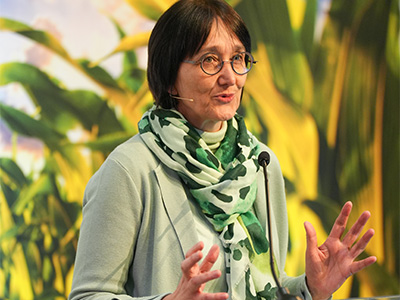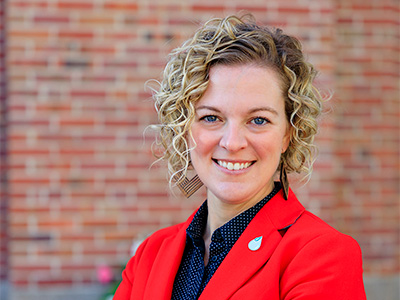The University of Nebraska–Lincoln’s Heuermann Lecture on April 29 featured Claudia Ringler, Ph.D., director of natural resources and resilience at the International Food Policy Research Institute. Her keynote address offered a compelling exploration of the often-overlooked connection between irrigation and nutrition. The lecture was hosted as part of the week-long 2025 Water for Food Global Conference by the Daugherty Water for Food Global Institute at the University of Nebraska.
“If you have water security, you are more likely to have food security,” Ringler told a full auditorium at Nebraska’s Innovation Campus. “If you are water insecure you are actually consuming fewer food groups and are more likely to be malnourished.” Yet, she explained, traditional nutrition science has largely overlooked how irrigation influences dietary quality and health outcomes.

Ringler emphasized how irrigation supports food security by extending the growing season, improving crop yields, diversifying food production, supporting animal products (eggs, milk, etc.) and enhancing the effectiveness of other agricultural inputs. “[Through irrigation], we are expanding the growing season. We are improving the cropping index. We are diversifying the production mix,” she said. “We improve the benefits of other inputs such as fertilizers or seed technologies.”
Additionally, in many low- and middle-income countries, irrigation systems often serve dual purposes by supporting not only agricultural production, but also household water needs. “And so, water for domestic uses is also important for nutrition,” Ringler said, stressing that, “to maximize the nutrition benefits from irrigation, we have to pay more attention to domestic water.”
“There are a lot of opportunities to improve,” Ringler said. “And I think Nebraska, with its strong irrigation industry, is well-positioned to lead in this space, in finding ways to produce more with less water.” She noted that there is a direct link between research and development investment and food security, and while there has been significant progress, it has also slowed significantly. Many farmers around the world still lack access to the technologies and practices needed to use water efficiently, improve yields, and support better nutrition.
Ringler emphasized that the relationship between irrigation and nutrition is not a straight line, but intentional planning can help close the gap. She introduced four pathways that can help ensure irrigation systems contribute to improved nutrition:
- Promoting crop biodiversity to increase nutrient density in diets
- Raising household incomes through productive agriculture
- Improving water access for hygiene and sanitation
- Supporting women, who are more likely to be household cooks and child caretakers, to be involved in agricultural irrigation and decision-making, which is linked to reduced child undernutrition.
She also highlighted the dual challenges of poor sanitation and malnutrition, which frequently co-occur in water-insecure communities. In this context, irrigation can be a powerful tool to improve both health and agricultural outcomes.
A panel discussion moderated by Jesse Bell, Ph.D., DWFI director of water, climate and health, followed Ringler’s talk. During the panel, Abbie Raikes, Ph.D., director of the University of Nebraska Medical Center’s Center for Global Health and Development, noted that food insecurity is not just a global issue. “Here in Nebraska, nearly 50% of families report some level of food insecurity,” she said. Drawing on her experience working in Rwanda, where stunting affects 35–40% of children, Raikes emphasized the importance of learning from innovations abroad and breaking down silos between agriculture and public health. “I’ve worked in public health for a long time,” she said, “and rarely do I see the agricultural community represented. It’s encouraging to see this audience engaged and ready to take on the challenge.”
Brandon Hunnicutt, a fifth-generation Nebraska farmer and chairman of the Nebraska Corn Board, echoed the importance of collaboration and innovation, sharing how farmers in the state are working closely with the University of Nebraska to improve water use efficiency and sustainability.
Ringler concluded with a challenge to all attendees:
“Take one thing from this talk and apply it to your work. Anyone working in irrigation has the power to help move the needle on nutrition.”
Heuermann Lectures are sponsored by the University of Nebraska’s Institute of Agriculture and Natural Resources and funded by a gift from the late B. Keith and Norma Heuermann of Phillips. The Heuermanns have been longtime university supporters, with a strong commitment to the state’s production agriculture, natural resources, rural areas and people.
Watch the full Heuermann Lecture
###
About the Daugherty Water for Food Global Institute
The Daugherty Water for Food Global Institute at the University of Nebraska was founded in 2010 to address the global challenge of achieving food security with less stress on water resources by conducting scientific and policy research, using the results to inform and advise policymakers, and educating future water for food leaders. Learn more at waterforfood.nebraska.edu.


